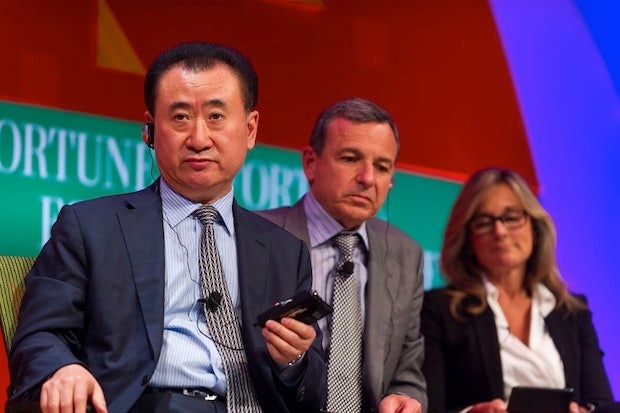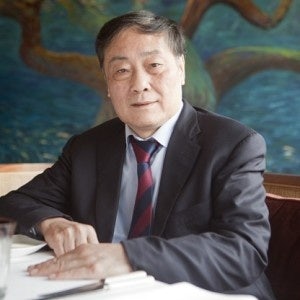
China's richest man, Wang Jianlin. (Fortune Global Forum)
The slew of China “rich lists,” which measure the growing superpower’s wealthiest citizens, don’t always reach the same conclusions, but they do agree on one thing: despite a slowing economy, China’s rich are getting richer.
The inaugural Billionaire Census, compiled by Singapore-based research firm Wealth-X and UBS and published Wednesday, found that China is home to the second most billionaires in the world with 157, after the United States at 515. Hong Kong was the city with the second most billionaires (75), after New York City (96), and both Shanghai and Shenzhen made the top 20, with 19 and 16 billionaires respectively.
The study found that there are 2,170 individuals in the world with a net worth of at least $1 billion, and combined they controlled $6.5 trillion in wealth, greater than the GDP of every country on earth except the United States and China. There were ten more billionaires on the list compared to last year, and the billionaire population’s net worth grew by 5.3 percent in 2012. Asia saw the biggest rise in billionaires, with a total of 508, 18 more than the previous year. Their overall net worth climbed by 13 percent.
The Asia-Pacific Wealth Report, meanwhile, compiled Capgemini and RBC Wealth Management, found that the number of high-net-worth individuals (HNWIs) in China has increased 14.3 percent to 643,000, the fourth largest population of HNWIs in the world, while the group’s total wealth grew by 15.3 percent to $3.13 trillion.

Zong Qinghou.
Three prominent rich lists—Hurun, Forbes and Bloomberg—all agree that Wang Jianlin, chairman of Dalian Wanda Group, is China’s richest person. But the order gets murkier further down. According to the Forbes 2013 list, which was published October 16, Wang rose to the top spot with a total wealth of $14.1 billion. Zong Qinghou, CEO of Wahaha Co. Ltd., dropped to second place with an accumulated fortune of $11.2 billion. Next on the list was Li Yanhong, chief executive of Baidu, China’s largest search engine, worth $11.1 billion.
The rest of the list runs as follows: Li Hejun, board chairman of Hanergy Group ($10.9 billion); Ma Huaten, CEO of Tencent ($10.2 billion); Wei Jianjun, CEO of Great Wall Motor Co. Ltd., and family ($9 billion); Yang Huiyan, vice chairman of Country Garden, a real estate company ($7.2 billion); Ma Yun, CEO of Alibaba Group, an e-commerce company ($7.1 billion); He Xiangjian, founder of Midea Group ($6.8 billion); and Liu Yongxing, chairman of aluminum- and plastic-focused firm East Hope Group ($6.1 billion).
Compare Forbes’ results with those of the Hurun Research Institute’s 15th annual Hurun Rich List, a ranking of China’s 1,000 wealthiest individuals. Wang Jianlin also tops Hurun’s list, but with an amassed fortune of $22.2 billion—more than $8 billion more than his worth according to Forbes. Zhou Qinghou (and family) was second with a net worth of $18.9 billion—almost $5 billion more than first place Wang on the Forbes list. Li Yanhong, third on the Forbes list, drops to sixth place according to Hurun’s ranking, with $8.1 billion in his bank account. The discrepancies continue on down the list.
Bloomberg Billionaires Index, a daily ranking of the world’s richest people, includes six Chinese citizens: Wang Jianlin ($13 billion), Zong Qinghou ($12.6 billion), Li Yanhong ($11.2 billion), Ma Huaten ($10.6 billion), Wei Jian Jun ($7.8 billion) and Yang Huiyan ($7.9 billion) as of November 6, 2013.
Hurun’s rankings are calculated through publicly available data from the listed companies issued before the firm’s August 15 deadline, while the Forbes list is calculated based on financial informational and shareholdings before the September 26 deadline. The wealth of unlisted companies is estimated by comparing them with similar listed firms.
Bloomberg arrives at its figure using methodologies that vary from individual to individual. It gives each member a confidence rating. All Chinese billionaires on the Bloomberg list are given four-star confidence ratings: “The majority of the individual’s fortune is held in publicly traded companies or private operations in a country where transparent data is available. The billionaire may hold shares through a holding company where ownership is not transparent. The billionaire or their representatives may provide insight on the net worth calculation.”
Combined, the lists reveal some interesting trends:
- Beijing, despite pollution woes and the economic clout of Shanghai and Shenzhen, remains home to the most billionaires in China.
- Many of China’s ultra-wealthy are also involved with politics. The number of rich individuals in China’s legislature grew by 20 percent this year, with 90 members of the National People’s Congress on Hurun’s list, up from 75 last year.
- While many of China’s rich are getting richer, those in real estate and IT are growing their money the most, while others in industries such as clothing, liquor, iron, steel and other metals are shirking in wealth.
Some experts suggest that these lists don’t completely reflect the level of wealth in China. According to a study by Chinese economist Wang Xiaolu, Chinese households have much more income than official data suggests. The third edition of Wang’s Chinese Grey Income study, which was published last month, found that when it comes to the top 10 percent of households, per capita income should be 3.2 times higher than the National Bureau of Statistics suggests.
That finding was echoed by Credit Suisse analyst Rogerio Fujimori, who noted that the understatement of total income for higher earners in China is even more pronounced than the average gap of two-times for all Chinese householders, with big implications for luxury brands. “The Chinese official household income data substantially understates the income of top earners and hence the spending power of the target clientele of luxury goods brands in China,” Fujimori writes. “With official statistics significantly under-estimating the spending power of the target clientele of luxury goods brands in China, the high level of Chinese luxury consumption looks likely sustainable given the ‘subsidy’ from grey income.”
Credit Suisse’s 2013 Global Wealth Report found that China accounted for 9 percent, or $22 trillion, of global wealth in 2013, as well as 4 percent, or more than one million, of the world’s population of millionaires. Credit Suisse estimates that Chinese spending accounts for as much as 30 percent of global sales for luxury brands. Fujimori said Burberry Group, Swatch Group, Prada, Tiffany and Chow Tai Fook were all especially well-positioned in China.